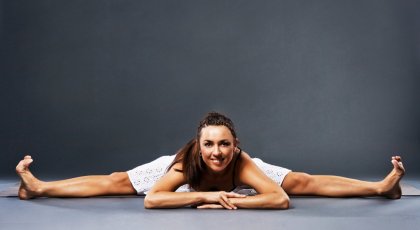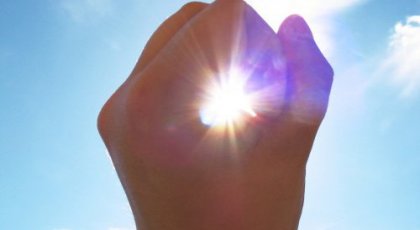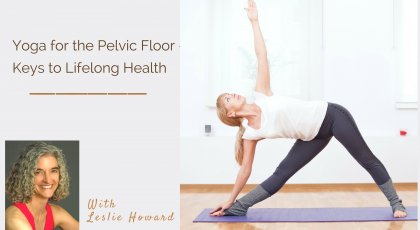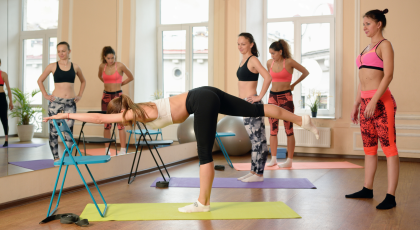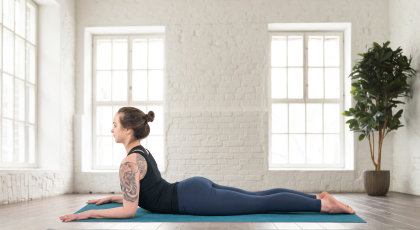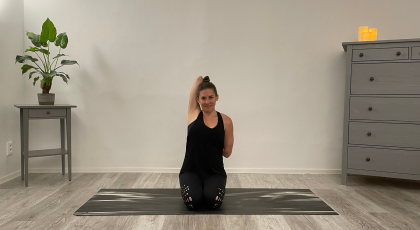View basket (0 items $0.00)

Yoga for Heart Disease and COPD
Heart failure and chronic obstructive pulmonary disease (COPD) are debilitating and potentially fatal conditions. While emerging research suggests that yoga may be beneficial for those with heart failure and COPD, many elderly adults lack access to these programs. A study published in BMC Complementary and Alternative Medicine suggests that Tele-Yoga may be one solution for bringing yoga to those who need it most.
Researchers randomly assigned 15 elderly adults (mean age 71.2 years, three male, all but one Caucasian) with a dual diagnosis of heart failure and COPD to either a Tele-Yoga program (seven participants) or an educational control group (eight participants). The home-based Tele-Yoga program was offered for one hour, twice per week for eight weeks.
Tele-Yoga classes were based on previously tested programs for heart failure and COPD developed by an experienced Iyengar yoga instructor. Sessions included breathing exercises, yoga postures, imagery, meditation and relaxation. Postures were modified for each participant using verbal cues, explanation and demonstrations. Participants were offered a yoga mat and asked to use household items as props as needed.
The Tele-Yoga program was delivered using “DocBox technology,” which includes multipoint videoconferencing equipment. Yoga group participants consented to DocBox installation in their homes, allowing them to connect to live-streamed classes via an Internet connection to their TVs. This allowed each participant and the yoga instructor to see each other in real time. In addition, a research nurse monitored safety during the sessions by observing each participant’s live video.
Control group participants received written educational materials once per week in addition to a weekly call from the research nurse to discuss the educational topics. Content included access to online medications, complementary and alternative therapies, sleep problems, depression, dietary guidance, the flu and vaccinations, and elder abuse.
Participants from the Tele-Yoga group (six) and control group (six) were asked to partake in a semi-structured interview between one week and three months following the completion of the program. The interviews explored participant impressions on a variety of topics including symptoms, functioning, expectations for the program, their experience with the program and assessment processes, and suggestions for improvement. Researchers organized these responses into a number of themes to structure their analyses.
Tele-Yoga May Be a Feasible Alternative to In-Person Instruction
The majority of yoga group participants attended at least 13 of the 16 classes offered (one individual dropped out). All but two participants in the control group completed the program.
Most yoga group participants reported the yoga program was a positive experience. Overall, the Tele-Yoga format was viewed positively, with some finding that a home-based class motivated them to practice. Several were appreciative of the fact that the classes were designed for individuals with COPD and heart failure. Most (five of six) indicated that they would continue to practice yoga either by watching a DVD, using print materials from the yoga program, or by attending classes at a local senior center.
Tele-Yoga instruction recipients also indicated a number of uniquely important benefits of the program. Most important, several students learned to incorporate yogic breathing exercises into their daily lives. This is particularly salient given the fact that shortness of breath and related anxiety are commonly problematic and highly stressful for individuals with COPD and heart disease.
Yoga group individuals also suggested that released muscle tension in the neck and upper back, increased flexibility, stamina, and motivation to exercise, as well as the tools to enable them to more effectively manage shortness of breath, were particularly useful for increasing quality of life.
There were a number of challenges experienced by several of the students.
-
Half of those interviewed found the yoga classes to be challenging and several experienced difficulty with the postures.
-
Three of six yoga participants had difficulty with the videoconferencing technology including unreliable feeds, difficulty following instruction due to poor streaming video quality, insufficient IT support, and occasionally hearing or seeing other participants rather than the instructor, which some found to be distressing.
-
Data from yoga group participant interviews also shed light on the fact that individuals with COPD and heart failure suffer from poor physical functioning, myriad physical and psychological symptoms, social isolation, and treatment regimens that severely restrict their free time. This may make Tele-Yoga access particularly useful for this population.
For the most part, individuals in the yoga group and educational materials group reported their involvement in this pilot study to be a positive experience. This suggests that online yoga education platforms may provide a useful option for those with limited access to appropriate therapeutic yoga classes, or with physical or medical restrictions that make travel or mobility difficult.
For more recent yoga and heart health news from B Grace Bullock: read the Study Review on Yoga for Heart Disease.
Study with YogaUOnline and Baxter Bell, MD: Yoga for Heart Health-New Insights for Healthy Aging
 B Grace Bullock, PhD, E-RYT 500 is a psychologist, research scientist, educator, author, yoga and mindfulness expert and creator ofBREATHE: 7 Skills for Mindful Relationships. Her mission is to reduce stress, increase health and wellbeing and improve the quality of relationships. She offers classes, workshops, writing and research that combine the wisdom of applied neuroscience, psychophysiology, psychology and contemplative science and practice. Her goal is to empower individuals, groups, leaders and organizations to reduce chronic stress and increase awareness, attention, compassion, mindfulness and effective communication to strengthen relationships, release dysfunctional patterns and unlock new and healthy ways of being. Dr. Bullock is a Certified Viniyoga Therapist and Faculty at the Integrated Health Yoga Therapy (IHYT) Training program. She is the former Senior Research Scientist at the Mind & Life Institute and former Editor-in-Chief of the International Journal of Yoga Therapy. For more information see www.bgracebullock.com
B Grace Bullock, PhD, E-RYT 500 is a psychologist, research scientist, educator, author, yoga and mindfulness expert and creator ofBREATHE: 7 Skills for Mindful Relationships. Her mission is to reduce stress, increase health and wellbeing and improve the quality of relationships. She offers classes, workshops, writing and research that combine the wisdom of applied neuroscience, psychophysiology, psychology and contemplative science and practice. Her goal is to empower individuals, groups, leaders and organizations to reduce chronic stress and increase awareness, attention, compassion, mindfulness and effective communication to strengthen relationships, release dysfunctional patterns and unlock new and healthy ways of being. Dr. Bullock is a Certified Viniyoga Therapist and Faculty at the Integrated Health Yoga Therapy (IHYT) Training program. She is the former Senior Research Scientist at the Mind & Life Institute and former Editor-in-Chief of the International Journal of Yoga Therapy. For more information see www.bgracebullock.com
Sources
Selman, L., McDermott, K, Donesky, D., Citron, T. & Howie-Esquivel, J. (2015). Appropriateness and acceptability of a Tele-Yoga intervention for people with heart failure and chronic obstructive pulmonary disease: Qualitative findings from a controlled pilot study. BMC
Complementary & Alternative Medicine, 15 (21). DOI 10.1186/s12906-015-0540-8.
Featured Courses

